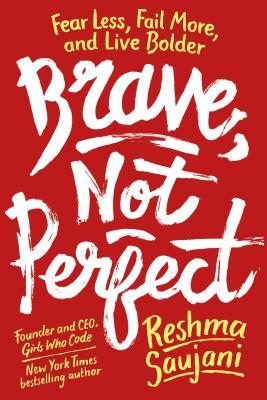
Brave, Not Perfect: Fear Less, Fail More, and Live Bolder
by Reshma Saujani
23 popular highlights from this book
Key Insights & Memorable Quotes
Below are the most popular and impactful highlights and quotes from Brave, Not Perfect: Fear Less, Fail More, and Live Bolder:
The desire to be perfect holds us back in so many ways. We don't speak up for ourselves, as we know deep down we should, because we don't want to be seen as pushy, bitchy, or just straight-up unlikeable. When we do speak up, many of us agonize and overthink how to express ourselves, trying to hit just the right note of assertiveness without seeming too "bossy" or aggressive. We obsessively analyze, consider, discuss, and weigh every angle before making a decision, no matter how small. And if we do, heaven forbid, make a mistake, we feel as though our world is falling apart.
We've become conditioned to compromise and shrink ourselves in order to be liked. The problem is, when you work so hard to get everyone to like you, you very often end up not liking yourself so much.
The work here isn't to figure out why they didn't like you, or who's right and who's wrong. It's to practice being okay with the idea that there are some people who will get you and some people who won't...and that's fine.
One of the hallmarks of happiness is having close, meaningful connections with others. But keeping up a facade of having it all together keeps us isolated, because it keeps us from forging real, honest, deep relationships where we can fully be ourselves and feel accepted exactly as we are.
We can't become unique by copying someone else's formula any more than we can become successful by striving for someone else's definition of success. And really, what's the point of succeeding by someone else's rules anyway?
Being brave like women is about making choices based on what we want and what makes us happy, not what others expect or want for us.
What will I weight more heavily, the sting of failing, or the pang of what might have been?
If you wait until everything lines up, it’s over.
I'm not alone in having spent my adult life only pursuing positions or projects I knew I'd ace. So many women stick to doing only the things at which they excel, rarely going beyond what makes them feel confident and comfortable.
In the start-up world, you’re not taken seriously if you haven’t had at least one colossal failure. The unofficial motto in Silicon Valley is “Fail early and often.” Almost no one gets it right the first, second, or even third time. Failure is baked into the innovation process; it’s how they learn what doesn’t work so they can home in on what does.
when she knows she’s wrong, says ”I’m sorry” without being defensive or shifting blame.
It takes bravery to let go of control and delegate, to aim for 100 percent but be okay if you come in at 90, to make mistakes and own up to them without sliding into shame. It takes bravery to take care of yourself and say no when that voice in your head is telling you to sacrifice everything for your job and family.... It takes bravery to give yourself a break and refuse to let guilt dictate your daily life, and to model self-compassion for your kids by letting them see it's okay to screw up.
learning to recognize when you’re being wisely cautious and when you’re talking yourself out of something just because you’re afraid.
In other words, boys are taught to be brave, while girls are taught to be perfect.
Anaïs Nin wrote, “Life shrinks or expands in proportion to one’s courage.
when she knows she’s wrong, says "I’m sorry" without being defensive or shifting blame.
I believe this “perfect or bust” mentality is a big part of why women are underrepresented in C-suites, in boardrooms, in Congress, and pretty much everywhere you look.
There’s a running theme in movies and on television about the nerdy guy who gets rejected and goes on to become Mark Zuckerberg, but there’s no similar narrative for girls.
Having perfect hair or the perfect body might land us a date, but it takes bravery to fall in love, and to do it all over again after our hearts have been broken.
The difference between excellence and perfection is like the difference between love and obsession. One is liberating, the other unhealthy.
What if, instead of feeling intimidated by an assertive woman and bitching about her behind her back, we talked about how we admire her instead?
Generosity and bravery are intertwined – especially when it comes to women supporting other women.
Yet this is an illusion that assumes we have power over how other people view and respond to us.


